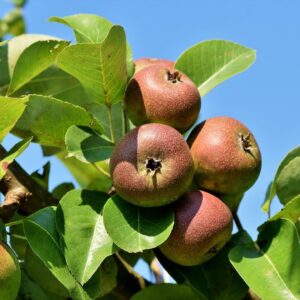Apples in Germany: Cultivation, Nutrition, and Culinary Traditions
The Importance of Apples in Germany
Apples play a crucial role in Germany’s diet. They are a staple in both traditional and modern German cuisine. Whether enjoyed fresh, baked in a cake, or turned into cider, apples are an essential fruit. But how significant are they in the German diet? And where exactly are they grown? In this article, we’ll dive into the importance of apples in Germany, their nutritional value, and the key regions where they are cultivated.

Fresh apples ready for harvest in a scenic apple orchard, symbolizing the importance of apples in German agriculture and cuisine.
Apples: A Core Part of German Cuisine
In Germany, apples are more than just a snack. They are an integral part of everyday meals. German cuisine uses apples in a variety of dishes, from stews and pies to refreshing juices. Apples are rich in vitamins, antioxidants, and fiber, making them an important part of a healthy diet.
Many Germans snack on apples throughout the day. Their versatility allows them to be enjoyed in many ways. Whether served with cheese or added to cereals, apples offer both flavor and nutrition.
The Nutritional Power of Apples
Apples are known for their excellent nutritional profile. A medium-sized apple contains about 95 calories, 25 grams of carbohydrates, and 4 grams of fiber. These qualities make apples a perfect snack for weight management. Apples are also high in Vitamin C, essential for a healthy immune system. Their fiber content helps digestion and maintains gut health.
In addition to physical health benefits, apples may improve cognitive function and reduce the risk of chronic diseases, including heart disease and certain cancers. Their impressive nutritional value makes them one of the healthiest fruits.
Where Are Apples Grown in Germany? Key Regions
Germany is one of the top apple producers in Europe. Several regions across the country are ideal for apple cultivation. The climate and soil conditions make Germany a prime location for growing a wide range of apple varieties.
Some of the most notable apple-growing regions include:
- Baden-Württemberg: This region is famous for its mild climate, which supports large apple orchards. Apples from this area are often used for cider production along the Rhine River.
- Hessen: Another key area for apple cultivation, Hessen boasts large orchards that produce a variety of apples, including sweet and tart types.
- Saxony: Located in the east, Saxony produces apples known for their unique sweetness. The region’s climate is perfect for apple orchards along the Elbe River.
- Thuringia: Thuringia is famous for its apple cider and apple-based dishes. The region celebrates its apple heritage with annual apple festivals.
- Brandenburg: While not the largest apple-growing region, Brandenburg is increasingly important in Germany’s apple production. The region has ideal microclimates that allow apples like Elstar, Jonagold, and Granny Smith to thrive. Many local farmers in Brandenburg are also focusing on organic apple farming.
The Culinary Use of Apples in Germany
German kitchens feature apples in a wide range of dishes. One of the most beloved is Apfelstrudel, a pastry filled with spiced apples, raisins, and cinnamon. This dessert is often enjoyed with powdered sugar on top.
Another popular apple dish is Apfelmus (applesauce), often paired with pork. This savory-sweet combination is a German classic. Apples are also featured in compotes, which are commonly served with meats, or baked into cakes like Apfelkuchen.
Apple cider, known as Apfelwein, is a traditional beverage in many regions, especially in Hessen and Frankfurt. The cider is often enjoyed during festivals, and local taverns are dedicated to serving it.
Apples in German Skincare
Apples are not only part of German food culture but also play a role in the country’s wellness industry. Apple extracts are commonly used in skincare products. These extracts are valued for their antioxidant properties, which help fight aging and rejuvenate the skin. Many German skincare brands use apples as a key ingredient in lotions, creams, and masks.
Conclusion: Apples in Germany – A Fruit Rich in Tradition and Health Benefits
Apples are an essential part of Germany’s nutrition and culinary traditions. From their cultivation in various regions to their presence in iconic dishes, apples are deeply embedded in German culture. Whether eaten fresh, baked into a dessert, or made into cider, apples are versatile and nutritious.
For those outside of Germany who are exploring German cuisine and traditions, apples represent a connection to the country’s rich agricultural and culinary heritage. Incorporating apples into your diet offers both health benefits and a taste of Germany’s long-standing traditions.

